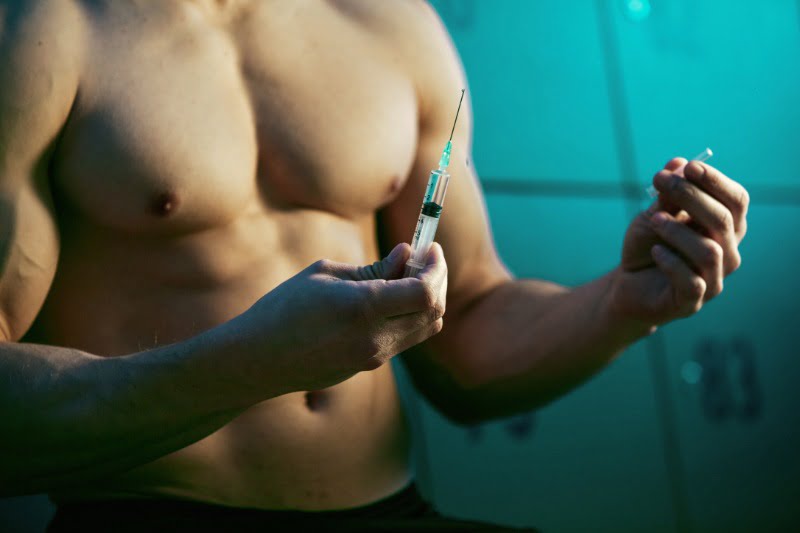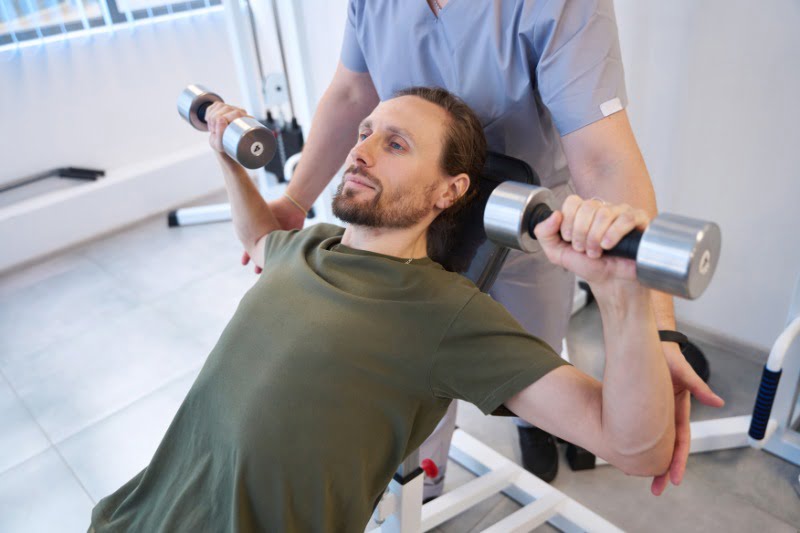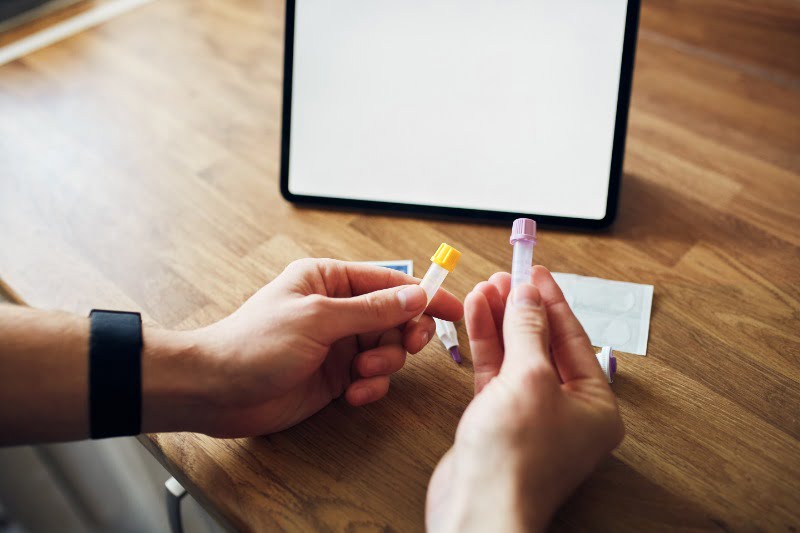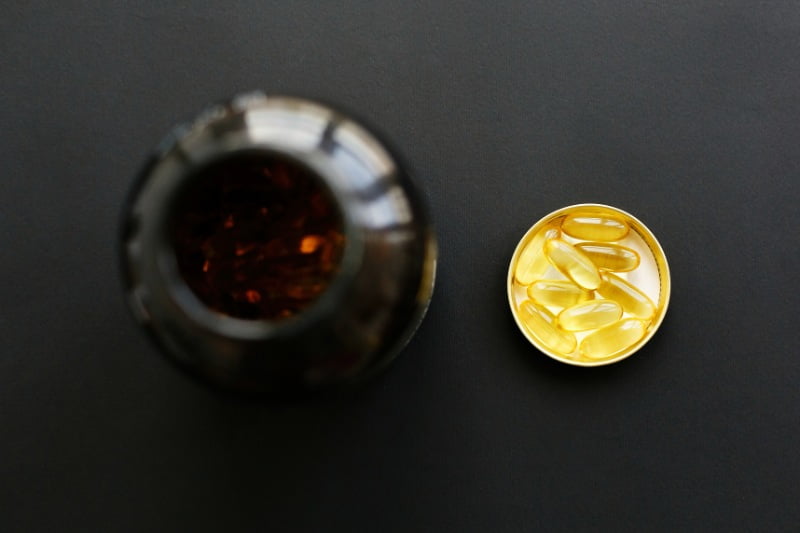Low T is an issue both men and women face, but this condition can be treated with testosterone therapy.
If you've wondered about the potential benefits and whether you may have a problem with TRT, you've come to the right place.
This article will cover information regarding TRT and how it can help men with low testosterone.
What is Testosterone Replacement Therapy (TRT)?
TRT, also called androgen replacement therapy, is a form of therapy that supplements low T levels with either a synthetic or bioidentical version of testosterone.


This hormone replacement therapy has garnered significant interest in recent years, especially as men seek to reverse or slow down the effects of clinical hypogonadism.
TRT supplements some testicular and pituitary gland functions by providing testosterone to the body.
TRT can lower male fertility despite being proven(1) effective for libido and erectile dysfunction problems.
Childless men who wish to become parents should seek professional medical advice before getting TRT or be content with adoption instead.
TRT is typically administered through prescription medication However, if you’re looking to boost your test levels naturally, over-the-counter testosterone-boosting supplements are also available.
How Does Testosterone Replacement Therapy Work? What Does TRT Do to Your Body?
TRT primarily seeks to solve the condition of testosterone deficiency through regular intake of prescribed medication.
Your doctor needs to diagnose you with low T before prescribing testosterone therapy.


Testosterone medication will increase your bone mineral density and strength(2) with repeated applications.
Note that TRT is a lifelong medication and will require constant administration.
Who Should Use Testosterone Replacement Therapy? When Is TRT Used?
TRT should only be used by men diagnosed with male hypogonadism.


Outside of hypogonadism, patients transitioning(3) from female to male or FTM can also use TRT.
It was previously assumed that TRT would worsen prostate cancer, but this has been debunked(4). Patients with prostate cancer can safely undergo TRT.
What Are the Signs and Symptoms of Low Testosterone Levels?
Here are some symptoms(5) of low T:
- Diminished or weakened sex drive
- Cognitive impairment
- Low energy
- Decreased muscle mass and strength


Who Should Not Take TRT?
Though TRT has been proven to help with low testosterone, TRT can exacerbate several health conditions.
Note that this list may not apply to all patients. Consult your doctor for more information.
- Breast cancer - A small-scale review(6) found that some FTM patients on TRT developed cancer of the breasts
- High red blood cell count - TRT can result in a higher concentration(7) of red blood cells in patients
- Diagnosed heart disease - Like strokes. However, a study(8) from JAMA internal medicine shows that healthy men pre-TRT aren't at risk.
Health Benefits of Testosterone Replacement Therapy
TRT can result in(9) the following:
- Better mood and cognition
- Greater muscle development and mass
- Stronger libido
- Higher bone mineral density
Types and Forms of Testosterone Replacement Therapy (TRT)
The FDA has approved various forms of testosterone administration.
- Oral testosterone - Taken in the form of pills
- Testosterone gel - Applied to the arms and should be covered by clothing
- Skin patch - Applied to your upper body once per day
- Buccal system - Oral tissues absorb the testosterone through a patch in the gums
What Results Can You Expect From Testosterone Replacement Therapy?
TRT can give you the following:
- Improved cognitive function and mood
- Improved erectile function(9)
- Increased muscular mass
How to Get TRT & How Much Does TRT Cost?
Before getting a testosterone therapy prescription, your doctor must conduct a blood test to check your test levels.


Note that testosterone levels typically fluctuate(10) throughout the day, so your doctor may conduct multiple blood tests to get a more accurate picture of your testosterone.
Doctors will check your body's levels of free testosterone. Any testosterone that isn't bound to sex hormone binding globulin or SHBG is considered "free t."
TRT costs between $150-$1500 per month, depending on the type of administration and whether your insurance covers all or a portion of the cost.
Is Testosterone Replacement Therapy Safe? What Are the Risks and Side Effects Linked to TRT?
TRT is safe, but the FDA cautions against using it unless you have hypogonadism. An FDA drug safety communication warns against using TRT for age-related problems(11).


If your doctor gives you an aging male diagnosis, you shouldn't undergo TRT.
- Benign prostatic hyperplasia - High levels of testosterone may cause(12) BPH.
- Sleep apnea - A study showed that TRT might cause(13) sleep apnea.
Are There Any Alternatives to TRT?
If your medical history reveals a risk factor that bars you from taking TRT, you can try these methods:
- Testosterone-boosting food supplements
- Decreasing possible sources of stress(14)
- Losing weight and exercising more
Can You Boost Low Testosterone Levels Naturally?
If you don't want to get TRT, there are other ways for you to raise your low T.
These include:
- Eating testosterone-rich foods like DHA-enriched fish oil(15)


- Increasing your vitamin D(16) intake
- Engaging in a resistance training workout regimen(17)
- Taking over-the-counter supplements that contain t-boosting ingredients
Frequently Asked Questions About TRT:
Learn a thing or two about TRT with these questions.
Can Testosterone Treatment Promote Youth and Vitality?
TRT is typically prescribed to older or middle-aged men to improve their energy and sex life, but there is little evidence that it will help male patients feel younger or increase their energy. More evidence suggests(18) that TRT can alleviate sexual dysfunction but not energy.
Does Insurance Cover TRT?
Any testosterone treatments you take will be covered by insurance, but only if you've been clinically diagnosed with low testosterone levels by your doctor. If you've been diagnosed with low test levels, contact your insurance company and ask if they will cover TRT.
How Long Should I Stay On Testosterone Replacement Therapy to Increase Testosterone Hormone, Strength, and Muscle Mass?
According to a review(19) of different sources and studies, testosterone treatment should be maintained for 3 to 4 months on average before any changes in muscle mass, lean body mass, or strength can be detected. You must continuously take treatments to supplement your lack of testosterone.
What Is the Difference Between TRT and Performance-Enhancing Steroids?
TRT is administered in controlled amounts upon the diagnosis and prescription of a doctor. A PED, like an anabolic steroid, is typically taken unregulated, and studies show that(20) abusing anabolic steroids can lead to a higher risk of cardiovascular disease.
Is TRT Used for Erectile Dysfunction and Loss of Energy and Libido?
TRT and testosterone products are typically used to treat erectile dysfunction and resolve male sexual function issues. However, this only applies to men with low T. TRT won't significantly affect(21) sexual desire in patients with normal testosterone levels.
What Should I Know About the Different TRT Options and Products?
While the FDA has deemed testosterone therapy safe, some of the various TRT options can still cause changes in people around the patient. Some of the risks of testosterone gels can cause(22) children to grow facial hair and cause the patient to develop blood clots.
Conclusion
If you believe you don't have enough testosterone, you can ask your doctor to check if you have a normal amount of testosterone.


TRT can be used to treat disorders caused by low T, but your doctor will still need to ensure that the effects you're experiencing aren't caused by normal aging before turning to TRT.
With the information here, you can take action and fix any testosterone-related problems you have.
- Rizk, Paul J et al. “Testosterone therapy improves erectile function and libido in hypogonadal men.” Current opinion in urology vol. 27,6 (2017): 511-515. doi:10.1097/MOU.0000000000000442↩
- Osterberg, E Charles et al. “Risks of testosterone replacement therapy in men.” Indian journal of urology : IJU : journal of the Urological Society of India vol. 30,1 (2014): 2-7. doi:10.4103/0970-1591.124197↩
- Unger, Cécile A. “Hormone therapy for transgender patients.” Translational andrology and urology vol. 5,6 (2016): 877-884. doi:10.21037/tau.2016.09.04↩
- Morgentaler, Abraham. “Testosterone replacement therapy and prostate cancer.” The Urologic clinics of North America vol. 34,4 (2007): 555-63, vii. doi:10.1016/j.ucl.2007.08.002↩
- Jia, Huanguang et al. “Review of health risks of low testosterone and testosterone administration.” World journal of clinical cases vol. 3,4 (2015): 338-44. doi:10.12998/wjcc.v3.i4.338↩
- Ray, Al et al. “Testosterone therapy and risk of breast cancer development: a systematic review.” Current opinion in urology vol. 30,3 (2020): 340-348. doi:10.1097/MOU.0000000000000763↩
- Bachman, Eric et al. “Testosterone induces erythrocytosis via increased erythropoietin and suppressed hepcidin: evidence for a new erythropoietin/hemoglobin set point.” The journals of gerontology. Series A, Biological sciences and medical sciences vol. 69,6 (2014): 725-35. doi:10.1093/gerona/glt154↩
- Cheetham, T Craig et al. “Association of Testosterone Replacement With Cardiovascular Outcomes Among Men With Androgen Deficiency.” JAMA internal medicine vol. 177,4 (2017): 491-499. doi:10.1001/jamainternmed.2016.9546↩
- Bassil, Nazem et al. “The benefits and risks of testosterone replacement therapy: a review.” Therapeutics and clinical risk management vol. 5,3 (2009): 427-48. doi:10.2147/tcrm.s3025↩↩
- Ahokoski, O et al. “Biological day-to-day variation and daytime changes of testosterone, follitropin, lutropin and oestradiol-17beta in healthy men.” Clinical chemistry and laboratory medicine vol. 36,7 (1998): 485-91. doi:10.1515/CCLM.1998.081↩
- Center for Drug Evaluation and Research. “FDA Drug Safety Communication: FDA Cautions about Using Testosterone Products for Low Testosterone Due to Aging; Requires Labeling Change to Inform of Possible Increased Risk of Heart Attack and Stroke with Use.” U.S. Food and Drug Administration, FDA, 26 Feb. 2018, www.fda.gov/drugs/drug-safety-and-availability/fda-drug-safety-communication-fda-cautions-about-using-testosterone-products-low-testosterone-due.↩
- Rastrelli, Giulia et al. “Testosterone and Benign Prostatic Hyperplasia.” Sexual medicine reviews vol. 7,2 (2019): 259-271. doi:10.1016/j.sxmr.2018.10.006↩
- Hanafy, Han M. “Testosterone therapy and obstructive sleep apnea: is there a real connection?.” The journal of sexual medicine vol. 4,5 (2007): 1241-6. doi:10.1111/j.1743-6109.2007.00553.x↩
- Daly, W et al. “Relationship between stress hormones and testosterone with prolonged endurance exercise.” European journal of applied physiology vol. 93,4 (2005): 375-80. doi:10.1007/s00421-004-1223-1↩
- Abbott, Kylie et al. “Dietary supplementation with docosahexaenoic acid rich fish oil increases circulating levels of testosterone in overweight and obese men.” Prostaglandins, leukotrienes, and essential fatty acids vol. 163 (2020): 102204. doi:10.1016/j.plefa.2020.102204↩
- Pilz, S et al. “Effect of vitamin D supplementation on testosterone levels in men.” Hormone and metabolic research = Hormon- und Stoffwechselforschung = Hormones et metabolisme vol. 43,3 (2011): 223-5. doi:10.1055/s-0030-1269854↩
- Vingren, Jakob L et al. “Testosterone physiology in resistance exercise and training: the up-stream regulatory elements.” Sports medicine (Auckland, N.Z.) vol. 40,12 (2010): 1037-53. doi:10.2165/11536910-000000000-00000↩
- Qaseem, Amir et al. “Testosterone Treatment in Adult Men With Age-Related Low Testosterone: A Clinical Guideline From the American College of Physicians.” Annals of internal medicine vol. 172,2 (2020): 126-133. doi:10.7326/M19-0882↩
- Saad, Farid et al. “Onset of effects of testosterone treatment and time span until maximum effects are achieved.” European journal of endocrinology vol. 165,5 (2011): 675-85. doi:10.1530/EJE-11-0221↩
- Perry, Jamal C et al. “Anabolic Steroids and Cardiovascular Outcomes: The Controversy.” Cureus vol. 12,7 e9333. 22 Jul. 2020, doi:10.7759/cureus.9333↩
- Bhasin, Shalender. “Testosterone replacement in aging men: an evidence-based patient-centric perspective.” The Journal of clinical investigation vol. 131,4 (2021): e146607. doi:10.1172/JCI146607↩
- “Testosterone (Topical Application Route) Side Effects.” Mayo Clinic, Mayo Foundation for Medical Education and Research, 1 Nov. 2022, www.mayoclinic.org/drugs-supplements/testosterone-topical-application-route/side-effects/drg-20073444.
↩
